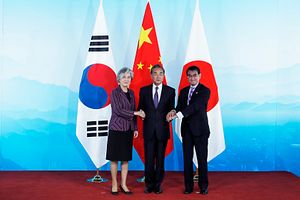Even as South Korea announced it was withdrawing from an intelligence sharing agreement with Japan, amid broader tensions in that bilateral relationship, the foreign ministers from both countries were in China for an annual trilateral dialogue. China’s Foreign Minister Wang Yi hosted his counterparts from South Korea and Japan, Kang Kyung-wha and Taro Kono, respectively, for a ministerial dialogue on Wednesday, with a bonus meeting between Kang, Kono, and Chinese Premier Li Keqiang on Thursday.
Japan-South Korea ties are locked in a downward spiral. Prior to today’s announcement about the scrapped intelligence agreement, Japan had placed export controls on materials critical to South Korea’s high-tech industry and removed South Korea from its “white list” of trusted trade partners. South Korea responded in kind. Japan’s trade restrictions are widely understood to be retaliation for 2018 court rulings that hold Japanese companies liable for Koreans’ forced labor during World War II (although the Japanese government has officially denied any connection). As always, historical issues continue to haunt Japan’s relationships with its neighbors.
The three foreign ministers gathered at Gubei Water Town in Beijing for the talks. Wang Yi expounded on the location of their meeting at “the foot of the Great Wall” as a symbol of the importance of history in all three countries:
China, the ROK and Japan all have a long history. History has given us both important inspirations and profound lessons. From our historical experiences, we should never forget or avoid history. Only by facing up to history can we look into the future and open up the future.
While Wang didn’t specifically target his remarks to any one country, China has used similar rhetoric to urge Japan to face up to imperial era-abuses, particularly during World War II. Yet the Chinese foreign minister avoided taking sides in the ongoing dispute, instead recommending that trilateral cooperation not be impacted. “Trilateral cooperation should transcend our differences and contradictions,” Wang said. “It requires us to stay committed to regional peace, stability and common prosperity. Now it is precisely an important opportunity for us to enhance cooperation.”
Later, ahead of the start of the official ministerial gathering, Wang urged Japan and South Korea to “resolve the current disputes properly through dialogue and consultation.”
Kono also expressed hope that trilateral cooperation could carry on despite bilateral tensions. “Two countries sometimes face various difficulties respectively, but even under such circumstances, Japan, China, and South Korea should work together trilaterally,” he said, according to the Japan Times. Kono had reportedly asked Wang and Kang to avoid raising bilateral issues during Wednesday’s meeting.
Kang didn’t explicitly target Japan in her public remarks, instead making an oblique comment that “it is important to eliminate unilateral and arbitrary trade retaliatory steps.” She and Kono held a separate bilateral meeting, but made no progress toward reconciliation. The best they could manage was agreeing to keep the door open for further dialogue.
Against that backdrop, the long-held dream of China-Japan-South Korea FTA – always one of the major talking points at these trilateral gatherings — seems far away. China, at least, is still interested. In his meeting with Kang and Kono, Premier Li called on all three sides to “work on reaching a comprehensive and high-level free trade agreement at an early date to promote the liberalization and facilitation of trade and investment.”
Despite the frosty atmosphere, it seems plans for a trilateral summit between the leaders of China, Japan, and South Korea are still on – at least for now. China is set to host that summit meeting as well. Originally planned as an annual gathering, since Japan’s Prime Minister Shinzo Abe came to power in 2012 trilateral summits have often been cancelled amid tense relations between two of the three countries involved. There were three year gaps between the fifth and sixth (2012 and 2015, respectively) and then the sixth and seventh summits (2015 and 2018). Yet Kang and Kono both expressed hopes for a successful summit later this year in their meeting with Li. Notably, however, the foreign ministers’ meeting concluded without setting a date for the top-level summit.
Kono and Kang last met in early August at another trilateral meeting, that one involving U.S. Secretary of State Mike Pompeo, in Bangkok, Thailand. That meeting likewise saw calls for dialogue without any concrete breakthroughs.

































